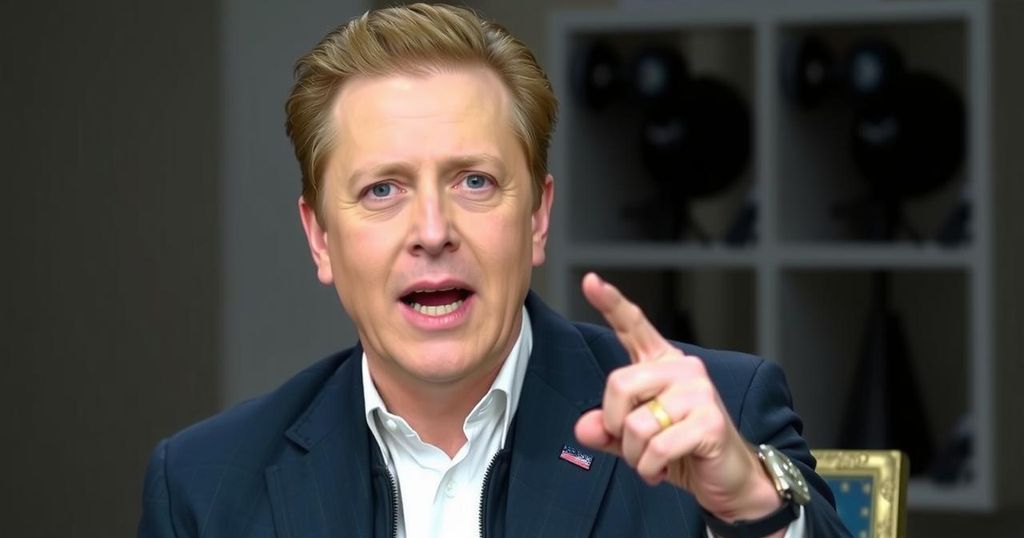Elon Musk Boosts German Far-Right Party AfD Before National Election
Elon Musk’s livestream with Alice Weidel of the AfD raised concerns about foreign influence in politics as he publicly endorsed the party ahead of Germany’s elections. The event attracted significant viewership and embraced controversial topics, including immigration and energy policies. The AfD, under scrutiny for extremism, is gaining popularity, reflecting a broader shift towards far-right ideologies across Europe.
In a recent livestream on the social media platform X, tech magnate Elon Musk appeared with Alice Weidel, the co-leader of Germany’s far-right Alternative for Germany (AfD) party, ahead of the country’s national election. During their conversation, Musk expressed his support for Weidel, suggesting that citizens should vote for the AfD and agreeing with her views on taxation, immigration, and energy policy. The livestream attracted over 200,000 viewers, prompting concerns across Europe about Musk’s influence in foreign politics.
Musk’s endorsement of Weidel comes amidst growing scrutiny of the AfD, which has faced surveillance from Germany’s domestic intelligence for suspected extremism. Mainstream political parties typically distance themselves from the AfD, which Weidel vehemently defends against claims of extremism, arguing that its principles are grounded in libertarian values distinct from Germany’s infamous Nazi history. The discussion also touched upon various philosophical topics, with Weidel characterizing Musk’s perspectives as “visionary.”
While the AfD has gained prominence in Germany, it is critical to note that it is not predicted to secure an outright victory in the upcoming election, with other parties maintaining higher support levels. Nonetheless, the party’s increasing popularity aligns with a broader trend across Europe, where far-right ideologies are seeing a resurgence. Musk’s involvement is fostering fears of escalating foreign influence in domestic politics, particularly involving a party under intense scrutiny due to its controversial stance on several issues.
Moreover, Musk’s past advocacy for other controversial figures, such as former U.K. extremist Tommy Robinson, raises further implications regarding his political engagements. The European Commission is closely monitoring Musk’s actions on X, emphasizing adherence to new digital regulations designed to mitigate the risks of hate speech and misinformation on social media. As the election approaches, various watchdogs will continue to scrutinize the impact of influential figures like Musk on democratic processes and public discourse in Europe.
The Alternative for Germany (AfD) party, established in 2013, has evolved significantly, transitioning from a platform primarily focused on opposition to EU bailouts to one that vehemently criticizes immigration policies. Its sharp rise in popularity reflects discontent with current political leadership and policies in Germany, particularly those embraced by Chancellor Olaf Scholz’s coalition government. This shift towards right-wing politics is not unique to Germany but resonates across Europe, where far-right parties are increasingly gaining traction amid public dissatisfaction with established political structures. This emerging political landscape amplifies concerns regarding the socio-political implications of endorsements from influential figures such as Elon Musk, who, through his platform X, can potentially sway public opinion.
Elon Musk’s livestream with Alice Weidel has noteworthy implications for both German politics and broader European political discourse. His public endorsement of the AfD, amidst the party’s controversial standing, raises significant concerns about foreign influence in domestic elections and the potential normalization of far-right ideologies. With continued scrutiny from regulatory bodies and political watchdogs, the intersection of social media influence and political dynamics will remain critical as the election approaches. The AfD’s ascent underscores a shifting political landscape in Germany and Europe, highlighting an increasing openness towards previously taboo far-right views.
Original Source: apnews.com




Post Comment